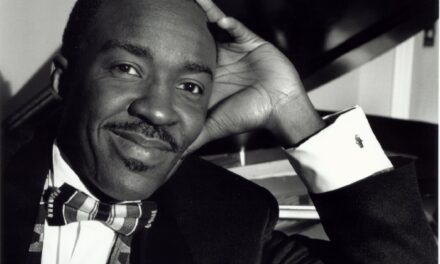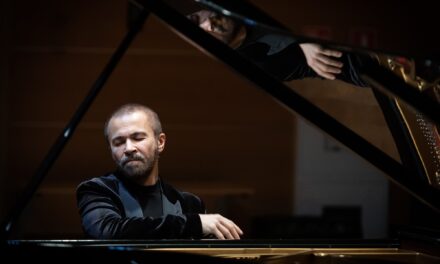“Parting,” Shakespeare wrote, “is such sweet sorrow,” but there was little of that in Meymandi Concert Hall on May 3, when Gerhardt Zimmermann led the NC Symphony in his last concert as its Music Director. There’s not yet an organ in Meymandi – there’s a hole where one may eventually be installed – but the Symphony managed to pull out a lot of figurative stops for this second of two “farewell” performances of an exceptionally attractive program.
One reason there was little sorrow is that the golden parachute Zimmermann has obtained from the orchestra ensures his ongoing presence here until 2008 or – according to former NCS Chairman R. Peyton Woodson III, who made introductory remarks – “for the years to come.” Woodson reminded the large audience that Zimmermann now becomes Conductor Laureate, the first former conductor of the NCS to hold that title, although in fact he is but the fourth formal MD in the orchestra’s 71-year history, following Lamar Stringfield, Benjamin F. Swalin, and John Gosling. His continuing relationship will surely be a boon to his successor, providing a sense of continuity that Zimmermann himself was denied, inasmuch as Gosling was never invited back after his departure. And of course further continuity will be provided by Associate Conductor William Henry Curry, hired on Zimmermann’s watch, who is now the NCS’ Interim Artistic Planning Advisor (IAPA).
We’re tempted to add to the ink that has been spilled in farewell tributes but will defer an assessment of Zimmermann’s musical efforts here till another time. Suffice it to say that, according to the tribute brochure distributed at these concerts, his first appearance with the NCS was in February 1981, he was appointed MD in May 1982 (in the wake of a protracted and sometimes bitter search for a new leader), and he directed the orchestra for the first time in its then-home venue, Raleigh’s Memorial Auditorium, in September 1982, on the occasion of the orchestra’s 50th anniversary celebrations, during which Swalin appeared at its helm for the last time. In a sense, this is more or less where some of us came in, isn’t it?
Many major events, some of which have been recapped elsewhere, occurred during Zimmermann’s tenure. Symphony staffer Scott Freck hit the highlights during his pre-concert lecture – the openings of Meymandi and the Summerfest Pavilion in Cary, hiring 37% of the current orchestra’s musicians, seeing the Raleigh classical series expand from seven programs, given once, to twelve, presented at least twice, and leading 887 performances, an average of about 3.5 per month for twenty-one years. The orchestra’s ongoing educational work wasn’t specifically touted, but it remains a major component of the NCS’ mission, so it is appropriate that a chamber choir from Cary High School provided the pre-concert entertainment in the Swalin Lobby.
That Zimmermann didn’t achieve everything long-time Symphony observers may still hope for is apparent – the orchestra is basically the same size it was in 1982, and demographically it remains a mostly-white band; thus as this MD departs, there is great hope for the future under the NCS’ new leader, yet to be announced, whom the NCS’ President and CEO himself has said will bring “a quantum leap in artistic excellence.” But that’s ahead, and this is now.
For his farewell as MD, Zimmermann selected a program that he and others said summed up his career as a conductor. Things got underway with Brahms’ “Gesang der Parzen,” a short, lovely choral work, sung by the 120-voice NC Master Chorale (formerly the Raleigh Oratorio Society), the rehabilitation of which Zimmermann encouraged. NCMC Artistic Director Alfred E. Sturgis prepared his singers admirably, and despite the distance from the podium to the choir stalls, they were with the conductor at every step.
Zimmermann has a professed passion for new music, and during his tenure the orchestra has been recognized for its programming of contemporary works. Composer Nathaniel Stookey, whose three-year Meet-the-Composer residency ends this season (he is returning to California), enjoyed the premiere of “Out of the Everywhere,” a twenty-minute, three-part essay, written for the occasion. It has strong programmatic ties (explained in the evening’s copious program notes) but works well enough as pure music, as several members of the audience observed, during the intermission. The work, with its wide dynamic ranges and rich palette of colors, rambles a bit, but the orchestra played it with evident precision and care, and it – and the composer – were warmly applauded.
The first half ended with Beethoven’s Choral Fantasy, performed by pianist Norman Krieger, a frequent guest soloist during the Zimmermann years, and somewhat ostentatiously augmented by a sextet of fine solo singers, at least some of whom have previous ties to the retiring conductor; they were sopranos Catherine Charlton and Margaret Bragle, mezzo-soprano Lucille Beer, tenors John Daniecki and Timothy Sparks, and baritone William Stone. The NCMC participated too, of course, and the work, which may be viewed as a Reader’s Digest precursor of the famous “Choral” Symphony (with a somewhat less compelling text), was rapturously received.
It may be worth noting that the Brahms was a first performance by the NCS; the Beethoven was last given in 1993, and the Lutoslawski, in 1985. The conductor has stated that the Concerto for Orchestra is one of the great scores of our time, and that is certainly true, but he has not aggressively championed it or Lutoslawski’s other orchestral music during his NCS tenure. (For the record, the first major work by this composer presented locally was heard at UNC, in the mid-’60s.) Still, the revival of this stunning Concerto was most welcome. The large, lightly augmented orchestra (with two harps, piano, etc.) played it with determination for all it is worth and then some, along the way reminding this listener of the sheer grit displayed by some of these musicians in the early years of “the Zimmermann era,” when the survival of the orchestra was by no means assured. At the end, the house erupted with sustained applause. The ovation lasted many minutes and would surely have persisted even longer had not the conductor taken Concertmaster Brian Reagan by the hand and led him and his colleagues off the stage. Thus ended an era in North Carolina’s cultural and social history.*
In a recent review of what may have been Wolfgang Sawallisch’s final concert as MD of the Philadelphia Orchestra**, New York Times critic Anthony Tommasini wrote that the Austrian Maestro’s “longevity is impressive.” He was surely speaking of that conductor’s age as well as his ten-year tenure in Philadelphia, which is twice the average duration of such appointments. The same may be said of Zimmermann’s tenure, here, where he beat the normal “shelf-life” by a factor of more than four. He may rest on his NC laurels with satisfaction, and he continues as MD of the orchestra he already headed when he came here, the Canton (Ohio) Symphony Orchestra.
But it’s time for a change in the Tar Heel State, and his replacement will surely usher in a whole new era. With Christof Perick in Charlotte and Dmitry Sitkovetsky just announced as the Greensboro Symphony’s new MD, the stakes are higher now than ever before. It’s fitting that Zimmermann retired on Derby Day, for our own little “horserace” is well underway. Let’s hope that music turns out to be the big winner in the Triangle and beyond!
*The 5th and 6th sentences of the 9th paragraph were edited 5/13/03 to incorporate material inadvertently omitted from this review when it was originally posted on 5/5/03.
**As it happened, Sawallisch was able to conduct his final performances with his orchestra in Philadelphia, where on May 10 he led the last of four performances of Beethoven’s Ninth Symphony.












